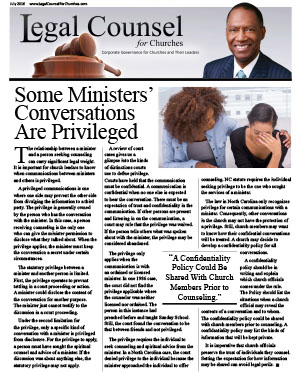The relationship between a minister and a person seeking counseling can carry significant legal weight. It is important for church leaders to know when communications between ministers and others is privileged.
A privileged communications is one where one side may prevent the other side from divulging the information to a third party. The privilege is generally owned by the person who has the conversation with the minister. In this case, a person receiving counseling is the only one who can give the minister permission to disclose what they talked about. When the privilege applies, the minister must keep the conversation a secret under certain circumstances.
The statutory privilege between a minister and another person is limited. First, the privilege operates to prevent tattling in a court proceeding or action. A minister could disclose the content of the conversation for another purpose. The minister just cannot testify to the discussion in a court proceeding.
Under the second limitation for the privilege, only a specific kind of conversation with a minister is privileged from disclosure. For the privilege to apply, a person must have sought the spiritual counsel and advice of a minister. If the discussion was about anything else, the statutory privilege may not apply.
A review of court cases gives us a glimpse into the kinds of distinctions courts use to define privilege. Courts have held that the communication must be confidential. A communication is confidential when no one else is expected to hear the conversation. There must be an expectation of trust and confidentiality in the communication. If other persons are present and listening in on the communication, a court may rule that the privilege was waived. If the person tells others what was spoken about with the minister, the privilege may be considered abandoned.
The privilege only applies when the communication is with an ordained or licensed minister. In one 1986 case, the court did not find the privilege applicable where the counselor was neither licensed nor ordained. The person in this instance had preached before and taught Sunday School. Still, the court found the conversation to be that between friends and not privileged.
The privilege requires the individual to seek counseling and spiritual advice from the minister. In a North Carolina case, the court denied privilege to the individual because the minister approached the individual to offer counseling. NC statute requires the individual seeking privilege to be the one who sought the services of a minister.
The law in North Carolina only recognizes privilege for certain communications with a minister. Consequently, other conversations in the church may not have the protection of a privilege. Still, church members may want to know how their confidential conversations will be treated. A church may decide to develop a confidentiality policy for all conversations.
A confidentiality policy should be in writing and explain which church officials comes under the rule. The Policy should list the situations when a church official may reveal the contents of a conversation and to whom. The confidentiality policy could be shared with church members prior to counseling. A confidentiality policy may list the kinds of information that will be kept private.
It is imperative that church officials preserve the trust of individuals they counsel. Setting the expectation for how information may be shared can avoid legal perils.

